-
 Formalism in Roman law prevails in all its branches, starting with the court procedure and ending in the interpersonal relations. Its role was to ensure the validity of consent and the procurement of evidence. The legal act in the Roman law was practically non-existent. The Roman legal documents received the proper form after the practice, according to the existing customs. It was the custom that dictated the form which any instrument meant to produce concrete legal effects, but also future legal effects, had to have. The legal report was formed through gestures and religious formalities, which gave rise to principles that ensured the optimal functioning of the legal system related to the context of that age. The updating of the formalism was required when there was an obstacle in achieving the goals of public and private order. The need to change the private law emphasized by the subjects of a legal relation and imposed by the economic evolution of trade has transformed a formalism that had its origin in religion, into a formalism dictated by current practices. In the current law, the civil legal act is born by the express manifestation of the will of the subjects of law, a will that must take a certain form. The observance of the form is ensured by the procedural formalism imposed by the legal norms in force. The present study analyzes the formalism of the Roman law and its imprint in the formation of the legal act from the positive law
Formalism in Roman law prevails in all its branches, starting with the court procedure and ending in the interpersonal relations. Its role was to ensure the validity of consent and the procurement of evidence. The legal act in the Roman law was practically non-existent. The Roman legal documents received the proper form after the practice, according to the existing customs. It was the custom that dictated the form which any instrument meant to produce concrete legal effects, but also future legal effects, had to have. The legal report was formed through gestures and religious formalities, which gave rise to principles that ensured the optimal functioning of the legal system related to the context of that age. The updating of the formalism was required when there was an obstacle in achieving the goals of public and private order. The need to change the private law emphasized by the subjects of a legal relation and imposed by the economic evolution of trade has transformed a formalism that had its origin in religion, into a formalism dictated by current practices. In the current law, the civil legal act is born by the express manifestation of the will of the subjects of law, a will that must take a certain form. The observance of the form is ensured by the procedural formalism imposed by the legal norms in force. The present study analyzes the formalism of the Roman law and its imprint in the formation of the legal act from the positive law -
 The mechanism of constitutional review plays an important role in the development of the normative system. It prevents the Parliament and the Government to adopt unconstitutional laws or ordinances and, at the same time, it stimulates them to edict normative regulations in accordance with the provisions of the Constitution. In what concerns the legislative omissions, the Constitutional Court of Romania is not competent to modify or to supplement the provisions under review, following the classical theory of ‘negative legislator’. Despite of a vast case-law that reflects this rule of conduct, a new and more flexible approach appears to be more effective in correcting the constitutional deficiencies. Pointing out the lack of constitutionality due to certain legislative omissions is what brings the Constitutional Court of Romania closer to the other European jurisdictions of constitutional review.
The mechanism of constitutional review plays an important role in the development of the normative system. It prevents the Parliament and the Government to adopt unconstitutional laws or ordinances and, at the same time, it stimulates them to edict normative regulations in accordance with the provisions of the Constitution. In what concerns the legislative omissions, the Constitutional Court of Romania is not competent to modify or to supplement the provisions under review, following the classical theory of ‘negative legislator’. Despite of a vast case-law that reflects this rule of conduct, a new and more flexible approach appears to be more effective in correcting the constitutional deficiencies. Pointing out the lack of constitutionality due to certain legislative omissions is what brings the Constitutional Court of Romania closer to the other European jurisdictions of constitutional review. -
 Rome was an example of universal state becoming the strongest state of the European antiquity, remaining however in the collective memory as a mechanism that worked perfectly, determined by the Roman law system that distinguished itself by the high degree of abstraction, by the lapidary logical constructions, as well as by a perfect legislative technique. It is unanimously acknowledged that the Roman law has not remained a mere historical document, continuing to directly influence subsequent regulatory systems, proving both its viability and its living spirit. This has lead to the suggestive assertion in the specialized doctrine that „although the kingdom of the Roman people has perished, the kingdom of Roman law still lives”1, and at a brief analysis it can be established that the Roman juridical way of thinking is present in the system of the European modern legislative construction.
Rome was an example of universal state becoming the strongest state of the European antiquity, remaining however in the collective memory as a mechanism that worked perfectly, determined by the Roman law system that distinguished itself by the high degree of abstraction, by the lapidary logical constructions, as well as by a perfect legislative technique. It is unanimously acknowledged that the Roman law has not remained a mere historical document, continuing to directly influence subsequent regulatory systems, proving both its viability and its living spirit. This has lead to the suggestive assertion in the specialized doctrine that „although the kingdom of the Roman people has perished, the kingdom of Roman law still lives”1, and at a brief analysis it can be established that the Roman juridical way of thinking is present in the system of the European modern legislative construction. -
 This article aims to analyze weight of the assessment report in customizing punishment. The author brings forward a number of theoretical, introductory approaches, which positions the reader within the relevant framework in understanding the tackled topic, including a brief history of customizing punishment and the assessment report, but also a number of legal issues.
This article aims to analyze weight of the assessment report in customizing punishment. The author brings forward a number of theoretical, introductory approaches, which positions the reader within the relevant framework in understanding the tackled topic, including a brief history of customizing punishment and the assessment report, but also a number of legal issues. -
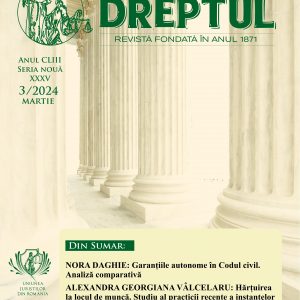
-
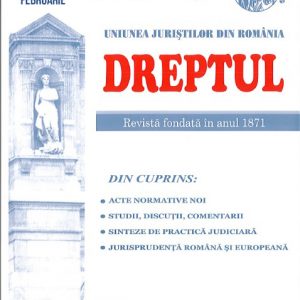 Curtea Constituțională a fost sesizată cu excepția de neconstituționalitate ridicată de un număr mare de funcționari publici trimiși în judecată pentru săvârșirea infracțiunii de abuz în serviciu, care a fost reglementată de art. 246 din Codul penal din 19691, având conținutul „Fapta funcționarului public, care, în exercițiul atribuțiilor de serviciu, cu știință, nu îndeplinește un act ori îl îndeplinește în mod defectuos și prin aceasta cauzează o vătămare intereselor legale ale unei persoane se pedepsește cu închisoare de la 6 luni la 3 ani”, precum și de art. 297 alin. (1) din Codul penal în vigoare, adoptat în anul 2009, potrivit căruia „Fapta funcționarului public care, în exercitarea atribuțiilor de serviciu, nu îndeplinește un act sau îl îndeplinește în mod defectuos și prin aceasta cauzează o pagubă ori o vătămare a drepturilor sau intereselor legitime ale unei persoane fizice sau ale unei persoane juridice se pedepsește cu închisoare de la 2 la 7 ani și interzicerea exercitării dreptului de a ocupa o funcție publică.”
Curtea Constituțională a fost sesizată cu excepția de neconstituționalitate ridicată de un număr mare de funcționari publici trimiși în judecată pentru săvârșirea infracțiunii de abuz în serviciu, care a fost reglementată de art. 246 din Codul penal din 19691, având conținutul „Fapta funcționarului public, care, în exercițiul atribuțiilor de serviciu, cu știință, nu îndeplinește un act ori îl îndeplinește în mod defectuos și prin aceasta cauzează o vătămare intereselor legale ale unei persoane se pedepsește cu închisoare de la 6 luni la 3 ani”, precum și de art. 297 alin. (1) din Codul penal în vigoare, adoptat în anul 2009, potrivit căruia „Fapta funcționarului public care, în exercitarea atribuțiilor de serviciu, nu îndeplinește un act sau îl îndeplinește în mod defectuos și prin aceasta cauzează o pagubă ori o vătămare a drepturilor sau intereselor legitime ale unei persoane fizice sau ale unei persoane juridice se pedepsește cu închisoare de la 2 la 7 ani și interzicerea exercitării dreptului de a ocupa o funcție publică.” -
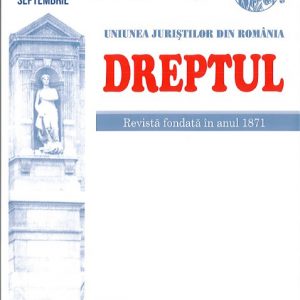 In the Draft law drawn up by the Ministry of Justice, the offence of abuse of office provided by Article 297 (1) of the Criminal Code is defined simplistically and formally, without clarity, precision and predictability. According to the Draft law, any act of breach of the law, of a Government Ordinance or of a Government Emergency Ordinance by a civil servant is considered to be an offence of abuse of office, regardless of its gravity and of its consequences, because its legal content is not circumscribed. In order for the offence of abuse of office not to be confused with the other forms of civil, disciplinary, administrative, fiscal, material or contraventional legal liability, we have introduced in its definition the condition that the deed must be committed for material interests, and the damage must cause particular serious consequences. In this way, the abuses in the interpretation and application of Article 297 (1) of the Criminal Code will be completely removed.
In the Draft law drawn up by the Ministry of Justice, the offence of abuse of office provided by Article 297 (1) of the Criminal Code is defined simplistically and formally, without clarity, precision and predictability. According to the Draft law, any act of breach of the law, of a Government Ordinance or of a Government Emergency Ordinance by a civil servant is considered to be an offence of abuse of office, regardless of its gravity and of its consequences, because its legal content is not circumscribed. In order for the offence of abuse of office not to be confused with the other forms of civil, disciplinary, administrative, fiscal, material or contraventional legal liability, we have introduced in its definition the condition that the deed must be committed for material interests, and the damage must cause particular serious consequences. In this way, the abuses in the interpretation and application of Article 297 (1) of the Criminal Code will be completely removed. -
 This study concerns the manner in which the abuse of office provided by Article 297 (1) of the Criminal Code is presented in the Draft law drawn up by the Ministry of Justice, appreciating that the offence is defined simplistically and formally, without clarity, precision and predictability. According to the Draft law, any act of breach of the law, of a Government Ordinance or of a Government Emergency Ordinance by a civil servant is considered to be offence of abuse of service, regardless of its severity and consequences, because the legal content thereof is not circumscribed. In order not to confuse the offence of abuse of service with the other forms of civil, disciplinary, administrative, fiscal, material or contraventional legal liability, we have introduced in its definition the condition that the act be committed for material interests, and that the damage cause particularly serious consequences. In this way, the abuses in the interpretation and application of Article 297 (1) of the Criminal Code will be completely removed.
This study concerns the manner in which the abuse of office provided by Article 297 (1) of the Criminal Code is presented in the Draft law drawn up by the Ministry of Justice, appreciating that the offence is defined simplistically and formally, without clarity, precision and predictability. According to the Draft law, any act of breach of the law, of a Government Ordinance or of a Government Emergency Ordinance by a civil servant is considered to be offence of abuse of service, regardless of its severity and consequences, because the legal content thereof is not circumscribed. In order not to confuse the offence of abuse of service with the other forms of civil, disciplinary, administrative, fiscal, material or contraventional legal liability, we have introduced in its definition the condition that the act be committed for material interests, and that the damage cause particularly serious consequences. In this way, the abuses in the interpretation and application of Article 297 (1) of the Criminal Code will be completely removed. -
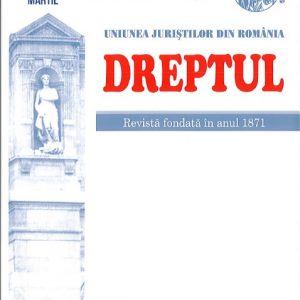 Practica judiciară recentă s-a confruntat cu numeroase frământări în legătură cu îndeplinirea elementelor constitutive ale infracțiunii de abuz în serviciu, prevăzută în art. 297 C.pen. Potrivit acestui articol, constituie infracțiunea de abuz în serviciu „fapta funcționarului public care, în exercitarea atribuțiilor de serviciu, nu îndeplinește un act sau îl îndeplinește în mod defectuos și prin aceasta cauzează o pagubă ori o vătămare a drepturilor sau intereselor legitime ale unei persoane fizice sau ale unei persoane juridice”
Practica judiciară recentă s-a confruntat cu numeroase frământări în legătură cu îndeplinirea elementelor constitutive ale infracțiunii de abuz în serviciu, prevăzută în art. 297 C.pen. Potrivit acestui articol, constituie infracțiunea de abuz în serviciu „fapta funcționarului public care, în exercitarea atribuțiilor de serviciu, nu îndeplinește un act sau îl îndeplinește în mod defectuos și prin aceasta cauzează o pagubă ori o vătămare a drepturilor sau intereselor legitime ale unei persoane fizice sau ale unei persoane juridice” -
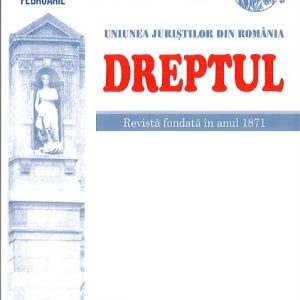 Introducere. Practica judiciară recentă s-a confruntat cu numeroase frământări în legătură cu îndeplinirea elementelor constitutive ale infracțiunii de abuz în serviciu, prevăzută în art. 297 C.pen.
Introducere. Practica judiciară recentă s-a confruntat cu numeroase frământări în legătură cu îndeplinirea elementelor constitutive ale infracțiunii de abuz în serviciu, prevăzută în art. 297 C.pen. -
 The author aims to present a historical perspective by connecting to the current juridical perspective, addressing and making an exegesis of one of the institutions which are convergent to the two essential procedural codifications, namely the Civil Procedure Code and the Criminal Procedure Code, but rather incompletely regulated by the legislator, namely the offence of hearing. Emphasizing the fact that in neither of the two Procedure Codes the notion of the offence of hearing is not expressely and categorically defined, the legislator has conceptualized the procedure which is going to be followed by the judge insofar as he directly finds, through his own senses, such an offence/deed provided by the criminal law, the two procedures presenting similarities, but also differences, some of them being non-resilient to scientific criticism, as we will try to demonstrate this conclusion in the content of the material, in which there have been inserted de lege ferenda proposals as well.
The author aims to present a historical perspective by connecting to the current juridical perspective, addressing and making an exegesis of one of the institutions which are convergent to the two essential procedural codifications, namely the Civil Procedure Code and the Criminal Procedure Code, but rather incompletely regulated by the legislator, namely the offence of hearing. Emphasizing the fact that in neither of the two Procedure Codes the notion of the offence of hearing is not expressely and categorically defined, the legislator has conceptualized the procedure which is going to be followed by the judge insofar as he directly finds, through his own senses, such an offence/deed provided by the criminal law, the two procedures presenting similarities, but also differences, some of them being non-resilient to scientific criticism, as we will try to demonstrate this conclusion in the content of the material, in which there have been inserted de lege ferenda proposals as well. -
 Fraudulent bankruptcy is one of the criminal law’s “Cinderellas” because the legislator was highly oscillating with regard to the sanctioning regime, the rules indicting this deed suffered frequent changes of the contents and the seat of the matter was found in the recent years in several legal acts (the Commercial Code, Law no. 31/1990, Law no. 64/1995, Law no. 85/2006 and the 2009 Criminal Code). This study focuses both on the analysis of the fraudulent bankruptcy offense under the new Criminal Code and on the specific concepts.
Fraudulent bankruptcy is one of the criminal law’s “Cinderellas” because the legislator was highly oscillating with regard to the sanctioning regime, the rules indicting this deed suffered frequent changes of the contents and the seat of the matter was found in the recent years in several legal acts (the Commercial Code, Law no. 31/1990, Law no. 64/1995, Law no. 85/2006 and the 2009 Criminal Code). This study focuses both on the analysis of the fraudulent bankruptcy offense under the new Criminal Code and on the specific concepts.
